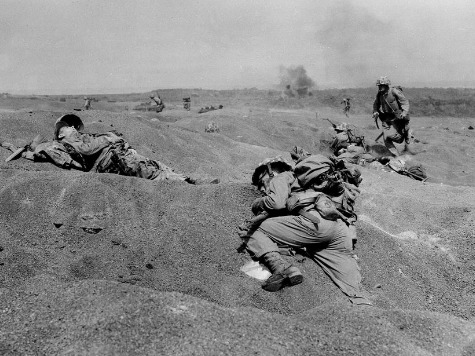
This Wednesday, February 19, marked the 69th anniversary of the Battle of Iwo Jima. One of the bloodiest battles in the Pacific War and all of World War II, the month-long slug-fest between American and Japanese forces in many ways set the stage for the firebombing of Japan and the dropping of atomic bombs on Hiroshima and Nagasaki.
In the final stages of the fighting, an iconic picture was taken of U.S. Marines and a Navy corpsman raising an American flag atop Mount Surabachi, an image that perfectly captured American resolve and military strength.
The men that raised the flag were Cpl. Harlon Block, Navy Pharmacist’s Mate John Bradley, Cpl. Rene Gagnon, PFC Franklin Sousley, Sgt. Michael Strank, and Cpl. Ira Hayes. Strank, Sousley, and Block were killed before the fighting ended. Associated Press photographer Joe Rosenthal won a Pulitzer Prize for the photograph, and it became the inspiration for the Iwo Jima memorial in Washington, D.C.
(Photo Credit: AP)
In what became a battle of inches, the fighting at Iwo Jima was some of the most ferocious in the entire Second World War. Nearly 7,000 Americans lost their lives in the fighting, and just fewer than 20,000 Japanese were slain as well, with very few taken captive. Twenty-seven Americans were awarded the Medal of Honor for heroic action in the battle, about half posthumously.
The capture of Iwo Jima was seen as critical for American strategy as it would be a useful launching point for future aerial attacks on mainland Japan, a tactic that would be relied more heavily on as the American people learned of the staggering casualties sustained during the fighting.
MARCH 3, 1945 U.S. Marines receive Communion from a Marine chaplain on Iwo Jima. The battle for the island was extremely costly for both sides: only about a thousand of the 25,000 Japanese defenders survived; the Americans suffered about 26,000 casualties. The island was not fully secured by the American forces until March 26, but the needed airfields were up and running earlier. (Photo Credit: AP)
In Robert S. Burrell’s book, The Ghosts of Iwo Jima, he wrote of President Harry Truman’s reaction to the horrific blood-letting of the battle:
Despite attempts to calm Truman’s fears, even the sanitized version of losses on Iwo Jima gave the President pause. Quite simply, the extensive manpower losses on Iwo Jima in comparison to the size of the enemy force hindered the approval of future, and inherently more vital, ground offenses.
As the American military inched its way toward the Japanese homeland, fighting became more bloody and intense as Japanese soldiers and civilians became desperate. The ground assault on Iwo Jima led to almost complete extermination of every Japanese soul living on the island, and the ones not outright killed by the U.S. military often took their own lives.
It was a sobering reminder of the depth of suffering that was all too common in the “total war” that the War in the Pacific had become. The American fighting man had made incredible sacrifices in that brutal month of fighting; the nation and the world saw the incredible American fighting spirit. However, the battle also demonstrated the necessity of ending that terrible war and bringing the weary soldiers home.
Burrell quoted Republican Rep. Otis Hal Holmes’s delivered address to Congress on November 5, 1945, prepared by Chaplain Rolland B. Gittelsohn and given at the 5th Marine Division cemetery at Iwo Jima:
Power of speech can add nothing to what these men and the other dead of our division who are not here have already done. All that we hope to do is to follow their example. To show the same selfless courage in peace that they did in war. To swear by the grace of God and the stubborn strength and power of human will, their sons and ours will never suffer these pains again. These men have done their job well. They have paid the ghastly price of freedom. If that freedom be once again lost, as it was after the last war, the unforgivable blame will be ours, not theirs…
The reality of unrelenting, horrific casualties that had become commonplace in the war against Japan convinced President Truman and American top brass that usage of the secret atomic weapons would be necessary to end the war. Though the dropping of the atomic bombs continues to inspire controversy, the depth and horror of the fighting on the tiny island of Iwo Jima provides a good point to the case that use of the weapons saved many lives and brought an early end to the war.
Upon dropping the bomb on Hiroshima, Truman wrote in a press release to the American people, “We are now prepared to obliterate more rapidly and completely every productive enterprise the Japanese have above ground in any city… we shall completely destroy Japan’s ability to make war.”
The anniversary of Iwo Jima is an important reminder of the price paid for freedom and security. However, as terrible as that cost may be, once war has started there is no substitute for victory.

COMMENTS
Please let us know if you're having issues with commenting.